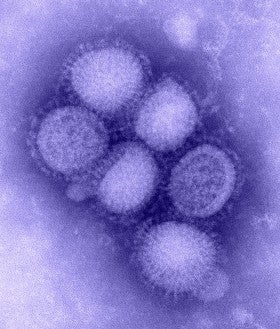Boulder campus monitors ongoing flu cases, issues recommendations
As Colorado heads into what could be an active flu season this fall and winter, University of Colorado officials are urging students, faculty and staff to take necessary precautions to avoid catching either seasonal flu or the H1N1 virus, and to stay abreast of breaking flu information and how it might affect their campus communities.
As of Friday, Sept. 4, the University of Colorado at Boulder has confirmed four cases of H1N1 and identified 85 probable H1N1 cases among CU-Boulder students — living both on and off campus — based on positive test results for Influenza A. One student who was hospitalized last week has since been released and is recovering.
Now that health officials have a better understanding of the virus, university health officials this week scaled back the testing protocol. Beginning next week, the university will report the number of cases with flu-like symptoms, but will primarily test students who meet high-risk criteria. It is expected that the number of cases of flu-like symptoms will be higher.
CU-Boulder is working closely with the Boulder County Health Department to monitor flu cases.
The University of Colorado at Colorado Springs (UCCS) has sent students and parents letters with information on preventive measures, but has not recorded any flu cases. As of Tuesday, three students at the University of Colorado Anschutz Medical Campus and one at the University of Colorado Denver Downtown Campus had been diagnosed with Influenza A, said Provost Rod Nairn, chair of the University of Colorado Denver flu preparedness task force.
"The university is doing everything it can to protect people and make the life of the university as disease free as it can," Nairn said. "But there is no substitute for individual knowledge and individual care."
All four CU campuses have implemented public awareness campaigns about seasonal and H1N1 flu, and will continue to issue recommendations throughout the fall and spring semesters. Faculty and staff are encouraged to visit their campus Web sites (see box).
To coincide with recommendations issued by the Centers for Disease Control and Prevention (CDC), university officials are advising students, faculty and staff to receive flu shots for seasonal influenza and H1N1. Pharmacies and health care centers in the Denver area have started dispensing seasonal flu shots, but the H1N1 vaccine is not expected to be available until mid-October. Among other recommendations, campus officials also are asking students, faculty and staff who come down with flu to stay home until they are symptom free.
"If this develops into a full-scale infectious disease pandemic, we're going to be getting information that could change rapidly, and people are going to have to make every effort to stay up to date, and every effort to help each other as a university community," he said.
At CU-Boulder, health care and administration officials are asking faculty to be flexible when it comes to students missing classes and making up work. Due to the number of expected illnesses, students should not be required to provide a note to excuse an absence from class after they have come down with flu symptoms, officials said in a campus communiqué.
The CDC does not recommend that universities cancel large-scale events such as football games or quarantine students or any individuals who may be infected with flu.
Unlike seasonal flu, which mostly afflicts the very young and the elderly, the Influenza A strain and the H1N1 virus have been diagnosed at higher rates among people in the 19-to-24 age group. In fact, the demographic is among the groups the CDC has identified as at-risk, and among the first who should receive the H11 flu vaccine.
To help curb the spread of flu strains and other highly contagious diseases, doctors and other experts at the campuses health clinics and emergency preparedness offices are asking students, faculty and staff to practice good hygiene (see tips in box) and "social distancing," or the notion of self isolation at home until all flu symptoms have subsided.
"It's very American. It's a cultural thing to power through illness," said Deborah Imel Nelson, emergency manager for CU-Boulder Environmental Health and Safety.
Nairn agreed. "There's a tradition among many of us that we're tough, we can work through anything, but we may not be doing the best thing," he said.
"We may get sicker, and it may take us longer to recover. One sneeze carries a lot of flu particles. We really need to think about that."
Seasonal and Influenza A, the flu strain that includes the H1N1 or "swine flu" virus, can share many of the same symptoms, including fever, body aches, cough, sneezing, and gastrointestinal problems. Experts believe the rapid onset of a fever accompanied by coughing can be the first signs of Influenza A or H1N1. To avoid flu and other contagious diseases, the CDC recommends the following good habits:
- Frequent and thorough hand washing: A time-honored tradition includes singing the Happy Birthday song as you wash your hands with warm water and soap.
- Cough and sneeze into your sleeve: Some health care experts describe it as the "Dracula move" because it requires you to raise your arm across your face.
- Social Distancing: If you do come down with flu, practice "social distancing," or the notion of staying home for up to 24 hours after your fever and other serious symptoms have subsided. When you do return to class or the office, try to stay at least three feet away from others until you are well.
- Get flu shots: Make sure you receive flu shots for both seasonal influenza and H1N1 once the vaccine becomes available in mid-October.
For more information, visit your campus H1N1 informational Web sites:
- CU-Boulder
- UC-Denver, Downtown Campus
- Anschutz Medical Campus
- UCCS
- UCH
- CDC
- Colorado Department of Public Health and Environment


